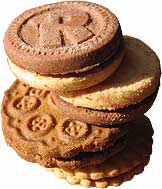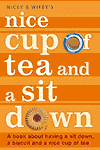Your ViewsKeep your e-mails pouring in, it's good to know that there are lots of you out there with views and opinions. To help you work out what is what, are now little icons to help you see biscuit related themes. And now you can see at a glance which are the most contested subjects via this graph (requires Flash 6.0 plugin). Please keep your mails coming in to nicey@nicecupofteaandasitdown.com | If you like, you can use this search thingy to find stuff that matches with any of the icons you pick, or use the fantastic free text search, Yay! | Your e-Mails |
Joanna Jenkins

Pan European Choc Sandwiches Review |
Nicey,
Great site - I like the reviews.
Intrigued by the puzzle of what "Gemista" could mean, I did a quick google search and discovered
that in Greek recipes it means "stuffed" (calamaria gemista = stuffed squid, avga gemista = stuffed eggs). At first I assumed it must be a description of how you'd feel if you ate them all in one go. Then I realised it might mean "filled" - a description of their sandwich construction.
What do you think? |
| Nicey replies: I think you're right so does, Eileen Foy and Zina Chroust who both mailed us as well.
|
| |
Nicky Bramley

Pan European Choc Sandwiches Review |
I think Bonnie Blackburn is nearly right, but it’s …. wait for it …. uppercase gamma, lowercase epsilon, mu, iota, sigma, tau, alpha = Gemista.
I don’t know what it means either, but then again I’m sure a Greek person would have a fine old time struggling with a a translation of “Abernethy”.
Nicky |
| Nicey replies: I've now put up the pack shots with the review so can all see Greek ones packet for yourselves. As for the translation of Abernethy that's simple, it's 'Mouth of the Nethy', as in the river Nethy. Named after the chap who invented them, who was named after the estuary of the river Nethy or at least his forbearers were, but we are going over old ground here. |
| |
Bonnie Blackburn

Pan European Choc Sandwiches Review |
Dear Nicey,
Having taken Koine (Biblical) Greek for a year in high school I may be of service in this instance of The Mystery of the Greek Biscuit. Judging by your description, the word would appear to be ???????, or, if your computer isn't picking up the Greek script, uppercase gamma, lowercase epsilon, mu, iota, delta, tau, alpha. Pronounced something like "Gemidta", with hard "g" and long "i". Unfortunately, I have no idea what it means. Provided, of course, it means anything at all.
Love the site. Everything I ever needed to know about tea and biscuits I learnt from NCOTAASD. Thank you for being such a fun part of our internet world.
Regards,
Bonnie
|
|
|
|




